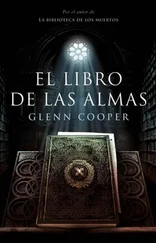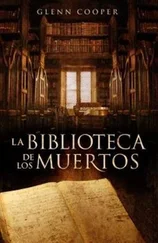Glenn Cooper - Library of the Dead
Здесь есть возможность читать онлайн «Glenn Cooper - Library of the Dead» весь текст электронной книги совершенно бесплатно (целиком полную версию без сокращений). В некоторых случаях можно слушать аудио, скачать через торрент в формате fb2 и присутствует краткое содержание. Жанр: Триллер, на английском языке. Описание произведения, (предисловие) а так же отзывы посетителей доступны на портале библиотеки ЛибКат.
- Название:Library of the Dead
- Автор:
- Жанр:
- Год:неизвестен
- ISBN:нет данных
- Рейтинг книги:3 / 5. Голосов: 1
-
Избранное:Добавить в избранное
- Отзывы:
-
Ваша оценка:
- 60
- 1
- 2
- 3
- 4
- 5
Library of the Dead: краткое содержание, описание и аннотация
Предлагаем к чтению аннотацию, описание, краткое содержание или предисловие (зависит от того, что написал сам автор книги «Library of the Dead»). Если вы не нашли необходимую информацию о книге — напишите в комментариях, мы постараемся отыскать её.
Library of the Dead — читать онлайн бесплатно полную книгу (весь текст) целиком
Ниже представлен текст книги, разбитый по страницам. Система сохранения места последней прочитанной страницы, позволяет с удобством читать онлайн бесплатно книгу «Library of the Dead», без необходимости каждый раз заново искать на чём Вы остановились. Поставьте закладку, и сможете в любой момент перейти на страницу, на которой закончили чтение.
Интервал:
Закладка:
And now they were on the verge of the seventh day of the seventh month of Anno Domini 777, confluent with the advent of the comet that Paulinus, the abbey astronomer, had warily named Cometes Luctus, the Comet of Lamentation.
And then there was the matter of Santesa, wife of Ubertus the stonecutter, nearing the end of her worrisome term.
How could everyone appear so placid?
What, in the Lord's name, would tomorrow bring?
The church at Vectis Abbey was a grand work in progress, a source of immense pride. The original timber and thatch church, built nearly a century earlier, was a sturdy structure that had held up well to the harsh coastal winds and the lashings of sea storms. The history of the church and the abbey were well known, as some of the older ministers had personally served with some of the founding brothers. Indeed, in his youth one of their number, the ancient Alric, now too infirm to even leave his cell for mass, had met Birinus, the exalted Bishop of Dorchester.
Birinus, a Frank, came to Wessex in the year 634, having been made a bishop by Pope Honorius with a commission to convert the heathen West Saxons. He soon found himself an arbiter of a civil war in this godforsaken land and endeavored to forge an alliance between the loutish West Saxon king, Cynegils, and Oswald, King of Northumbria, an entirely more agreeable sort, a Christian. But Oswald would not ally himself with a nonbeliever, and Birinus, sensing a glorious opportunity, persuaded Cynegils to convert to Christianity, personally pouring baptismal water over his filthy hair in the name of Christ.
A pact with Oswald followed, then a long peace, and Cynegils in gratitude gave Dorchester to Birinus as his episcopal see and became his benefactor. Birinus, for his part, embarked on a campaign to found abbeys in the tradition of St. Benedict throughout the southern lands, and when the charter for Vectis Abbey was established in 686, the year of the great plague, the last of the Isles of Britannia came to the bosom of Christianity. Cynegils bequeathed to the Church sixty hides of good land near running water on this island enclave, an easy sail from the Wessex shores.
Now it was up to Aetia, the present Bishop of Dorchester, to keep the silver flowing from royal households to Church interests. He had impressed on King Offa of Mercia the spiritual benefits of funding the next phase of glory for Vectis Abbey-its conversion from wood to masonry-to praise and honor the Lord. "For after all," the bishop had murmured to the king, "prestige is measured not in oak, but in stone."
In a quarry not far from the abbey walls, Italian stonecutters had been laboring for the past two years, chiseling blocks of sandstone and oxcarting them to the abbey, where the cementarii mortared them in place, slowly erecting the church walls using the existing timber structure as a frame. Throughout the day the incessant metallic clanging of chisel on stone filled the air, silenced only during the Offices, when the ministers filled the Sanctuary for quiet prayer and contemplation.
Josephus swept back through the dormitory on his way to Lauds and gently opened the door of Alric's cell to make sure the old monk had made it through the night. He was heartened to hear snoring, so he whispered a prayer over the curled body, slipped out and entered the church through the night stair.
Fewer than a dozen candles lit the Sanctuary, but the light was sufficient to prevent mishaps. High above, in the dark, Josephus could make out the shapes of fruit bats darting among the rafters. The brothers were standing on either side of the altar in two opposing ranks, patiently waiting for the abbot to arrive. Josephus sidled next to Paulinus, a small nervous monk, and had they not heard the heavy main door creaking open, they might have exchanged a furtive greeting. But the abbot was approaching and they dared not speak.
Abbot Oswyn was an imposing man with long limbs and large shoulders who had spent much of his life a head taller than his brethren, but in his later years he seemed to shrink as a painful curving of his spine stooped him. As a result of his malady his eyes were permanently cast downward at the earth and in recent years he found it nearly impossible to gaze up toward the heavens. Over time his disposition had darkened, which had inarguably cast a pall over the fraternity of the community.
The ministers could hear him shuffling into the Sanctuary, his sandals scraping the floorboards. As usual, his head was sharply lowered and the candlelight glinted off his shiny scalp and his snowy white fringe.
The abbot slowly climbed the altar stairs, grimacing at the effort, and took his place atop the altar under its canopied ciborium of polished walnut. He placed his palms flat on the smooth cool wood of the tabula and with a high, nasal voice intoned: "Aperi, Domine, os meum ad benedicendum nomen sanctum tuum."
The monks prayed and chanted in their two ranks, calling and responding, their voices melding and sonorously filling the Sanctuary. How many thousands of times had Josephus given voice to these prayers? Yet today he felt a particular need to call out to Christ for his mercy and forgiveness, and tears formed when he called out the last line of Psalmus 148.
"Alleluja, laudate Dominum de caelis, alleluja, alleluja!"
The day was warm and dry and the abbey was a beehive of activity. Josephus strode across the freshly scythed lawn of the cloisters quadrangle to make his morning rounds, checking on the critical functions of the community. At last count there were eighty-three souls at Vectis Abbey, not counting the day laborers, and each one expected to see the prior at least once in the day. He was not given to random inspections; he had his routine and it was known to all.
He started with the masons to see how the edifice was progressing, and noted ominously that Ubertus had not reported for work. He sought out Ubertus's eldest son, Julianus, a strapping teenage lad whose brown skin gleamed with sweat, and learned that Santesa's labor had begun. Ubertus would return when he was able.
"Better it is today than tomorrow, eh? That's what people are saying," Julianus told the prior, who solemnly nodded his agreement and asked to be informed of the birth when it occurred.
Josephus went on his way to the cellarium to check on meat and vegetable stores, then the granary to make sure the mice hadn't gotten into the wheat. At the brewery, he was obliged to sample from each barrel, and as he seemed unsure of the taste, he sampled again. Then he went to the kitchen adjoining the refectory to see if the sisters and their young novices were in good cheer. Next he toured the lavatorium to see if fresh water was properly flowing into the hand-washing trough, and then the outhouses, where he held his nose while inspecting the trench.
In the vegetable gardens, he checked how well the brothers were keeping the rabbits away from the tender shoots. Then he skirted the goat meadow to inspect his favorite building, the Scriptorium, where Paulinus was presiding over six ministers hunched at tables, making fine copies of The Rule of St. Benedict and the Holy Bible.
Josephus loved this chamber above all because of its silence and the nobleness of the vocation that was practiced within, and also because he found Paulinus to be pious and learned to a fault. If there were a question on the heavens or the seasons or any natural phenomenon, then Paulinus was ready with a thorough, patient, and correct interpretation. Idle conversation was frowned upon by the abbot, but Paulinus was an excellent source of purposeful discourse, which Josephus greatly valued.
The prior crept into the Scriptorium, taking great care not to interrupt the concentration of the copyists. The only sounds were the quills pleasantly scratching on vellum. He nodded to Paulinus, who acknowledged him with a hint of a smile. A greater show of camaraderie would not have been appropriate, as outward displays of affection were reserved for the Lord. Paulinus gestured him outside with the crook of his finger.
Читать дальшеИнтервал:
Закладка:
Похожие книги на «Library of the Dead»
Представляем Вашему вниманию похожие книги на «Library of the Dead» списком для выбора. Мы отобрали схожую по названию и смыслу литературу в надежде предоставить читателям больше вариантов отыскать новые, интересные, ещё непрочитанные произведения.
Обсуждение, отзывы о книге «Library of the Dead» и просто собственные мнения читателей. Оставьте ваши комментарии, напишите, что Вы думаете о произведении, его смысле или главных героях. Укажите что конкретно понравилось, а что нет, и почему Вы так считаете.












